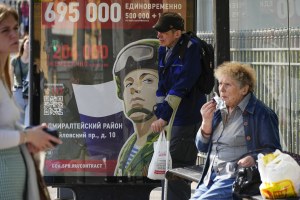While a majority continue to express support for the war and more now sense the military operation has been successful, the Russian public is divided on whether it has led to more positive or negative consequences.
A May 25-31, 2023 joint Chicago Council-Levada Center survey—conducted before the destruction of the Kakhovka dam and the start of Kyiv’s counteroffensive—finds that Russians are feeling more positive about their military’s performance in Ukraine than they were in November. Public support for the military operation1 remains stable compared to previous surveys, but Russians are sharply divided on whether the conflict has helped or hurt the country. Taken together, the data seem to indicate that the public is much more mixed in their views than it appears at first glance.
Key Findings
- More Russians now believe their country’s military operation in Ukraine has been successful (61%) than did in November (53%).
- Russians are now evenly divided between those who think Moscow should continue the military operation (48%, up from 38% in April) and those who think it should move to peace negotiations (45%, down from 51% in April).
- At the same time, support for the Russian military action has neither increased nor decreased. Three in four Russians (76%) continue to say they support the military operation, with 43 percent expressing strong support and 33 percent somewhat supporting it.
- A smaller majority of 66 percent say they would strongly (33%) or somewhat support (33%) a family member or close friend who voluntarily participated in the military operation.
- Other results reveal more division among the public. Nearly as many Russians say the special military operation in Ukraine has created more harm (41%) than more benefit (38%).
- If they had the opportunity to go back into the past, a plurality of Russians say they would have supported the start of military action against Ukraine (48%), but a sizable minority indicate they would have “cancelled” it before it started (39%).
More Russians Now Sense the Military Operation Has Been Successful
As Ukraine begins its counteroffensive against Russian military forces, new polling finds greater optimism among the Russian public about their armed forces’ performance. Six in 10 (61%) Russians say the special military operation (SMO) has been at least somewhat successful, up from 53 percent in November 2022. The percentage who thinks the military operation has been unsuccessful has dropped slightly from to 27 percent from 31 percent in November, and slightly fewer now indicate that it is “difficult to say.”

Underscoring the perception that Russia’s position has improved, 60 percent of Russians say that over the past year, their country has become stronger, while 73 percent say Ukraine has become weaker. Both of these more positive assessments about Russia’s strength and the success of the military operation coincide with the Wagner Group’s (a private for-hire military organization) major battlefield gains for Russia in the city of Bakhmut in Ukraine’s eastern Donbass region.

Slight Increase in Support for Continued Fighting
In addition to potentially reacting to the news of battleground success in Bakhmut, some Russians are now directly feeling the impact of the war. There have been increased attacks on the Russian side of the border that have killed more than a dozen civilians and displaced thousands from their homes. There have also been drone attacks in Moscow itself. As a result, some Russians may be sensing both greater success and increased bitterness about the conflict. As an example, Russians are now less keen to stop fighting than they were in April. While evenly divided between those who think Russia should continue the military operation (48%) and those who think it should move to peace negotiations (45%), the percentage who prefer to continue fighting has increased (from 38% in April to 48% now).

Focus group discussions conducted on April 20, 2023, among Muscovite men and women help to illustrate these mixed views. “Regardless of his or her position, no one wants this [war] to continue, in the sense that . . . everyone wants the war to end as soon as possible. At the same time, regardless of their position, everyone still supports their country,” one woman elaborated. Another woman added, “you can’t retreat and you can’t betray your citizens either.”
Three in Four Russians Continue to Support the Special Military Operation
As in November, four in 10 “definitely” support the actions of the Russian military forces (43%) and another third (33%) somewhat support the special operation. Two in 10 oppose the operation, and just 6 percent indicate that it is too difficult to answer. Older Russians, those who follow news about the conflict closely, and those who have a close friend or family member in the military services, are more likely to strongly support the military action against Ukraine. Younger Russians, the better-educated and heavy internet users are more likely than others to oppose the action.

Focus group comments shed light onto some of the motivations for this support. Participants seemed determined to support their country’s aims even if they hadn’t necessarily supported the idea of the military operation from the start. Several discussants evoked the language of patriotism and defense of the country, some of which has been undoubtedly transmitted through state-dominated media. “The fate of our country is at stake,” one male participant asserted, “to lose is to tear [Russia] into pieces.” Another man added that Russia’s success in the war is linked to “what our generation, our children, will inherit from us, that is what kind of country we leave them: either a big, strong, powerful Russia or just some fragments.” One of the men posited that “the feeling of patriotism should unite people; that is, even if people do not agree. . . somewhere in their soul they need to understand that defending common interests. . . the interests of the Russian people, the Russian language, Russian culture and so on, this should unite one way or another.”
"Everyone wants the war to end as soon as possible. At the same time, regardless of their position, everyone still supports their country."
While the survey finds that women are slightly less likely than men to support the military operation (74% versus 79% in the May survey), at least one female focus group participant was also moved by patriotic messages though she was somewhat skeptical to what end. “Probably there is something in the character of our people that, no matter what, they go to defend,” one female in the focus group stated, “only I do not know what they are going to protect.”
Both men and women remarked that since Russia in the war now, their side should succeed. For example, one woman said that “it seems to me that the people think, even those who are against the war, believe that we should . . . win anyway.” A male participant similarly stated, “We have to finish what we started.”
Two-Thirds Support Family Member or Close Friend Volunteering to Fight
The survey also included a more stringent level of support for the military operation: whether Russians would support a family member or close friend deciding to participate in the war. Under this more stringent test, a smaller majority of Russians (66%) say they would strongly (33%) or somewhat support (33%) a family member or close friend voluntarily participating in the military operation.
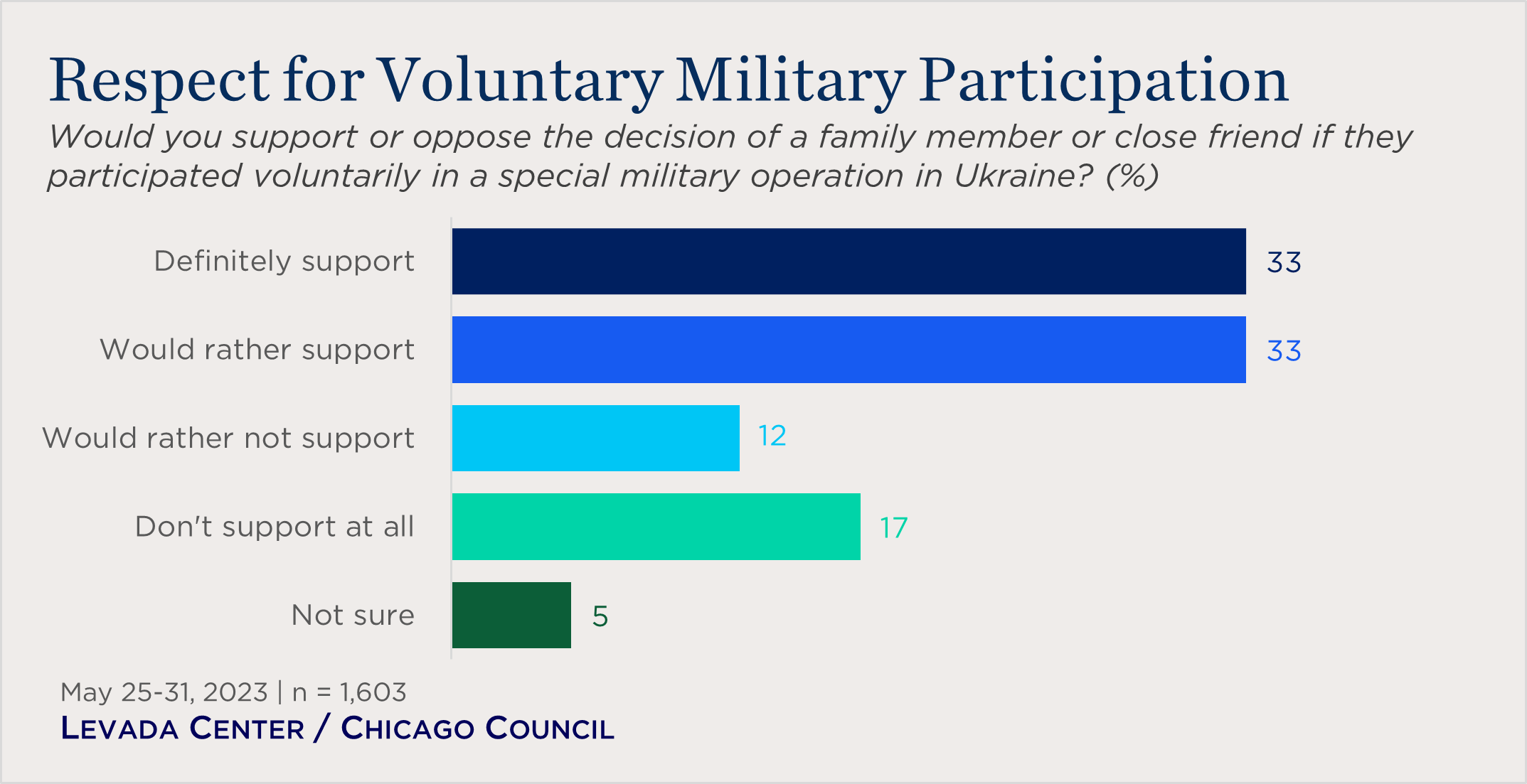
Though this is lower than the overall level of support for the military operation, most Russians do not outwardly support those who have fled the country to avoid participating. When asked about those Russians who left the country to prevent being conscripted in the partial mobilization set in motion last September, few say they are sympathetic (8%), although many say they feel indifferent (37%). A slight majority say they feel negatively toward those who fled the country (53%). There is a strong correlation of attitudes with age: younger respondents have rather neutral feelings (52%), whereas respondents older than 54 predominantly think in a negative way about those who left Russia. Young people most likely have more personal contacts with emigrants and are probably more mobile themselves.
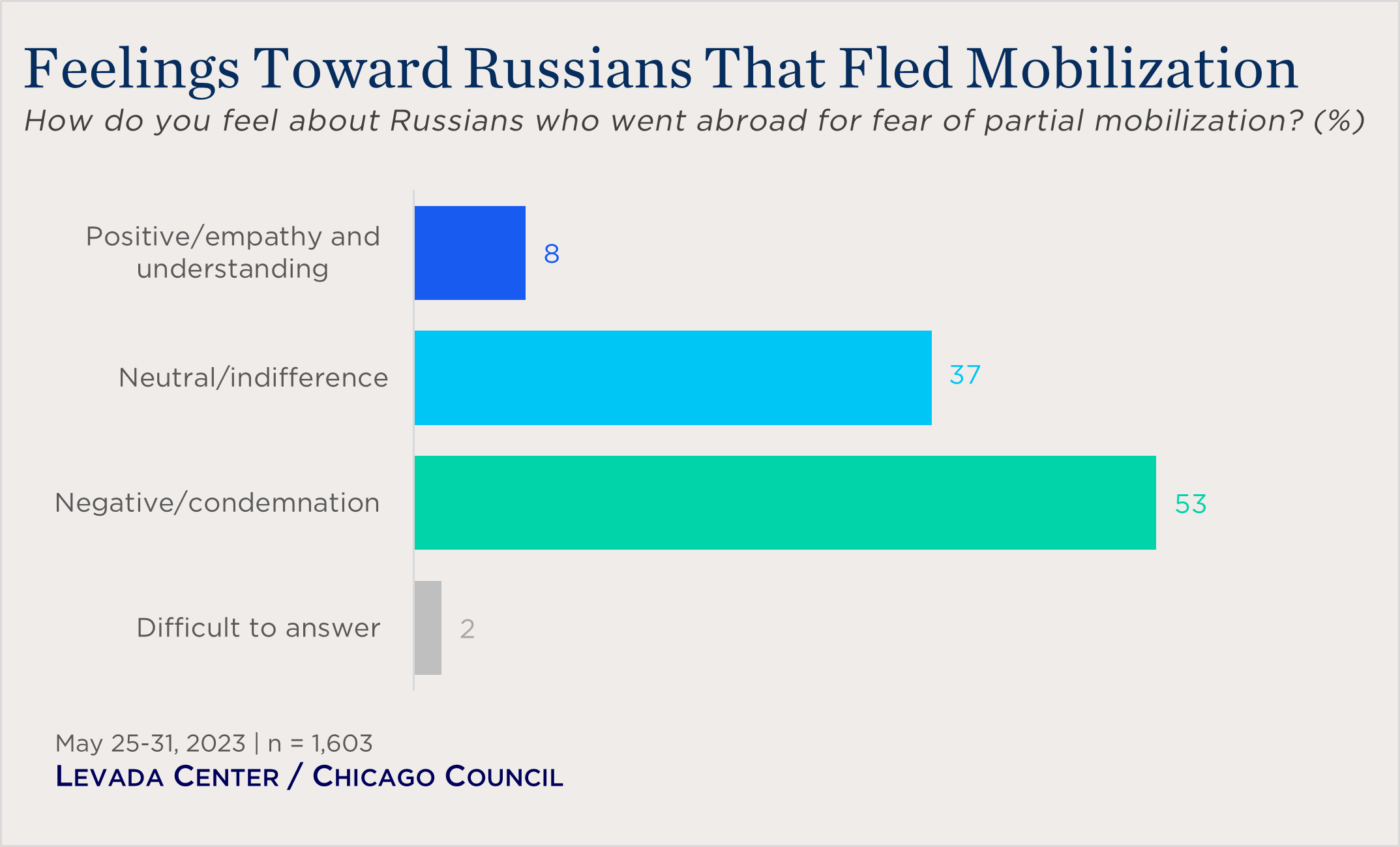
But in focus group comments among Muscovite women,2 most participants seemed to be understanding of those who left the country to avoid being conscripted. One woman even admitted that her own son had fled for that reason. “I don’t judge anyone,” another woman remarked, while others sympathetically commented, “I am for men who will do everything not to serve,” and “No man wants to be a murderer.” This topic was not addressed in the men’s focus group, but survey analysis shows no statistically significant difference between men and women in how they perceive those who moved outside the country.
Russian Public Much More Divided on Benefit or Harm from Conflict
While the preceding results suggest continued public backing for the military action, other questions reveal more discomfort with the war among many Russians. When asked whether the special military operation in Ukraine has brought more benefits or harm to Russia, the public is nearly evenly divided (38% benefit, 41% harm), with a full 20 percent indicating it is too difficult to say. In sharp contrast, Russians are much more convinced of the benefit to Russia from annexing Crimea (69% benefit vs. 18% harm), which occurred without violence.

When those survey respondents who think more benefits have been achieved from the military action in Ukraine are asked to specify what advantages they have in mind (in an open-ended question), the most frequent mentions include the return/addition of new territories (29%), the protection of Russian speakers and the people in eastern Ukraine (16%), preventing NATO expansion or aggression from the West (15%), strengthening Russia’s position in the world (12%), and protection against fascism (9%). Focus group participants were also asked about any positive impacts from the special military operation, but few were able to articulate solid responses aside from increased cooperation with China. But even that was qualified with warnings that “China will always pursue its own interests in everything.”
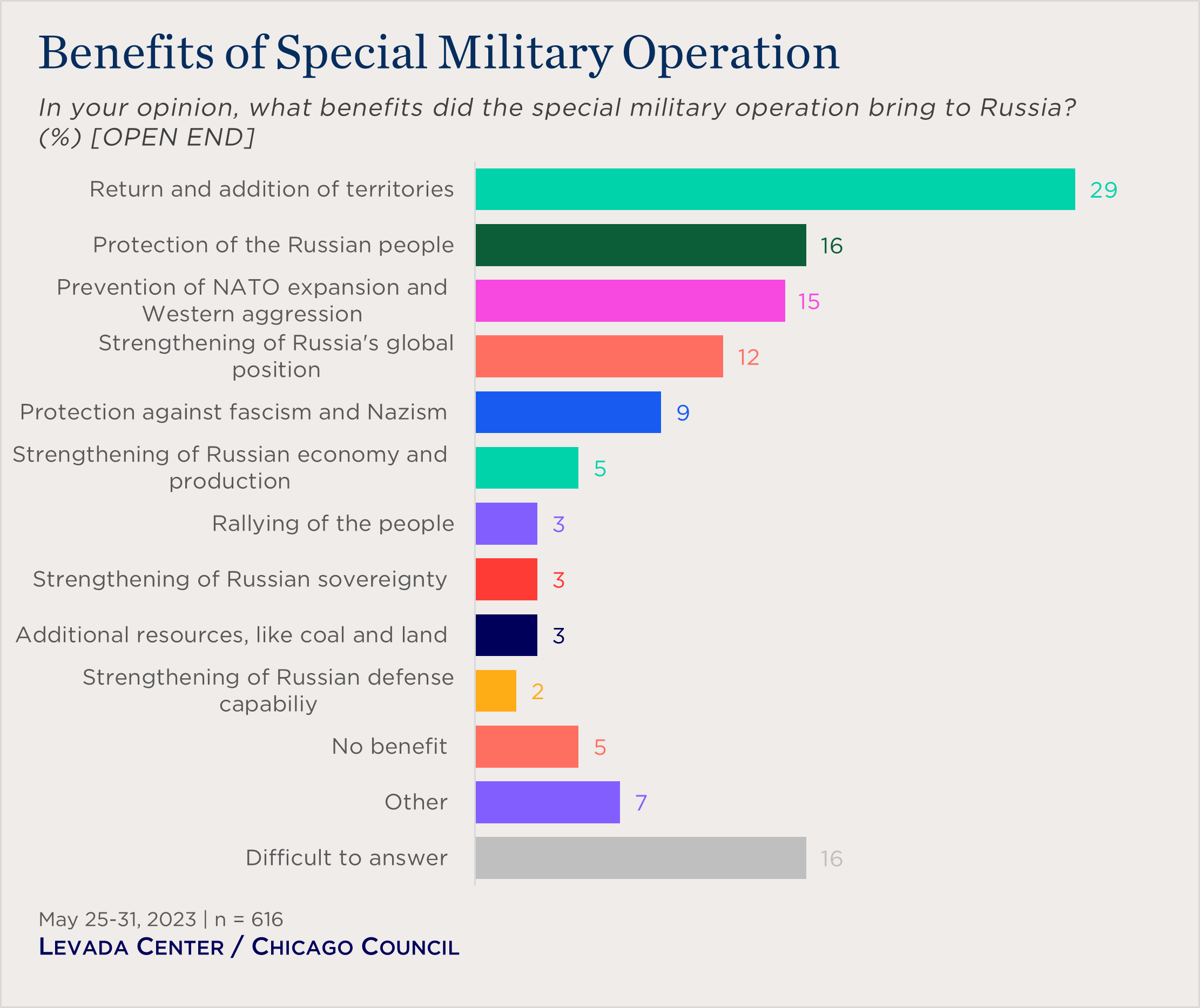
When those survey respondents who perceive more harm than benefit are asked to volunteer (in an open-ended question) what damages they see from the military operation, a majority focus on the death of civilians and soldiers (70% combined), followed by economic deterioration (20%) and international isolation (10%). Focus group participants also described damages caused by the conflict, including the human costs on both sides and the loss of many Russians who left the country because of the war.
Focus group members also talked about personal challenges related to the conflict: difficulties in traveling abroad, the inability to obtain certain goods and medicines, an increase in political repression for those disagreeing with government policy, and polarization within Russian society between those supporting and opposing the war. Participants described an overall collective sense of uncertainty and anxiety that “aggravates the general psychological atmosphere in the country.” One man seemed to hint at even being internally conflicted: “Over the past year, I don’t remember a single positive moment. Anytime you watch the news you feel like you are fighting yourself.”
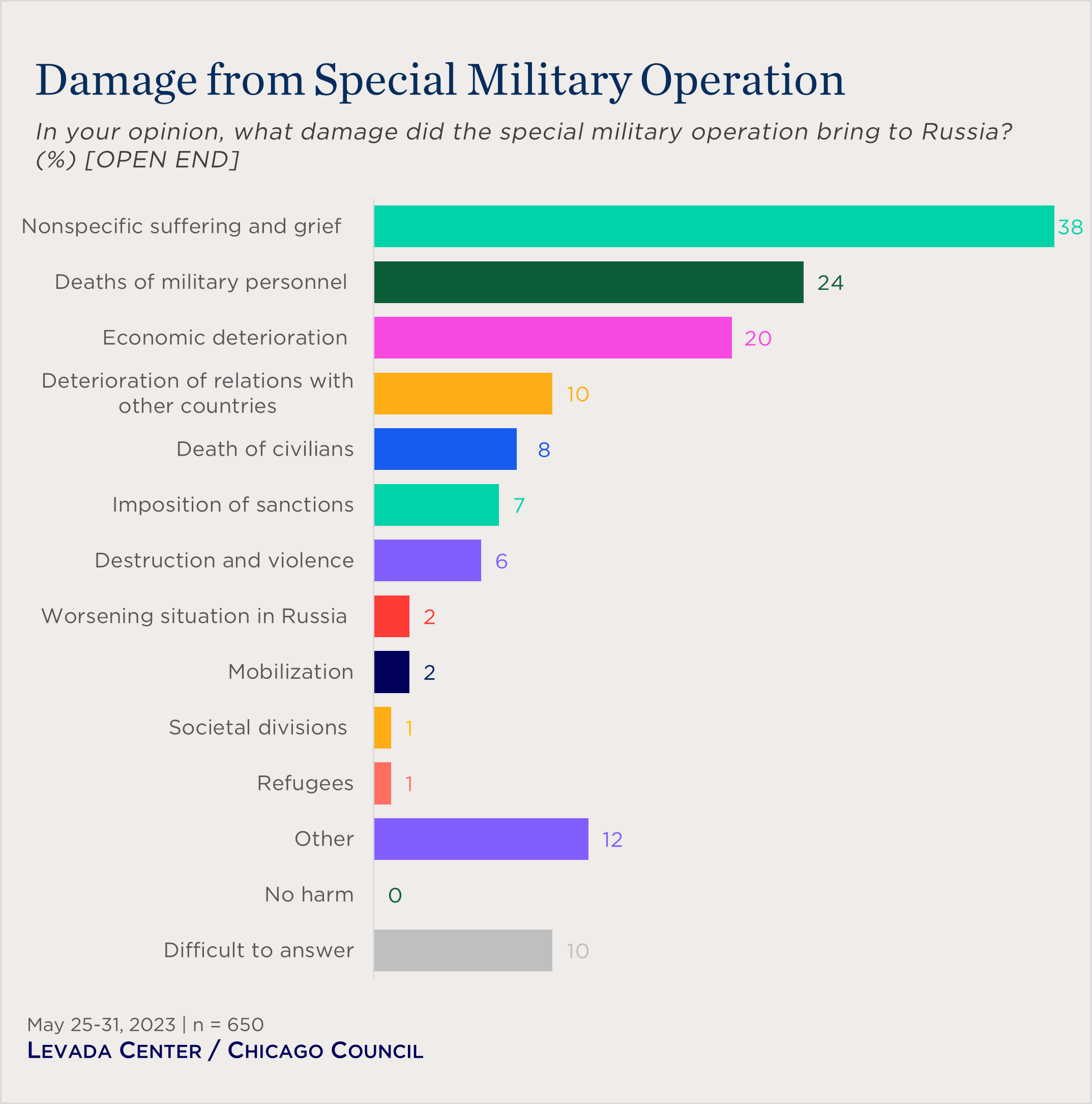
"We should have changed 2014, not 2022, so that Russia doesn’t take Crimea at all. What do we need it for?"
Given the significant harm that Russians perceive from the war, in hindsight, would they have preferred to prevent it? Not exactly. If they had the opportunity to go back into the past and “cancel or support the start of the military operation in Ukraine,” a plurality say they would support the military action (48%). But a sizable minority say they would cancel it (39%), once again suggesting that a significant portion of Russians, including some who say they support the war, are conflicted about its impacts. Women focus group participants were especially likely to say they would have opted to prevent the conflict. “I would have made sure that on February 24, Russia did not invade Ukraine,” and “Every sane person, of course, wants there to be no war but we were convinced it was inevitable,” were two typical comments. Another reflected wistfully, “We lived normally [before February 24]: one dollar cost 30 rubles . . . the borders were open, everything was calm and free.” And one woman went back even further, saying “We should have changed 2014, not 2022, so that Russia doesn’t take Crimea at all. What do we need it for?”
Russians Are Bracing for a Long Haul
Russians initially thought the special military operation would last for a year or less, but the results show that they are increasingly resigned to a longer fight. In the latest data, nearly half expect the conflict to last beyond another year (45%). This is up considerably compared to last May, when only 21 percent thought it would last that long. Few Russians now expect the war will end before six months from now.
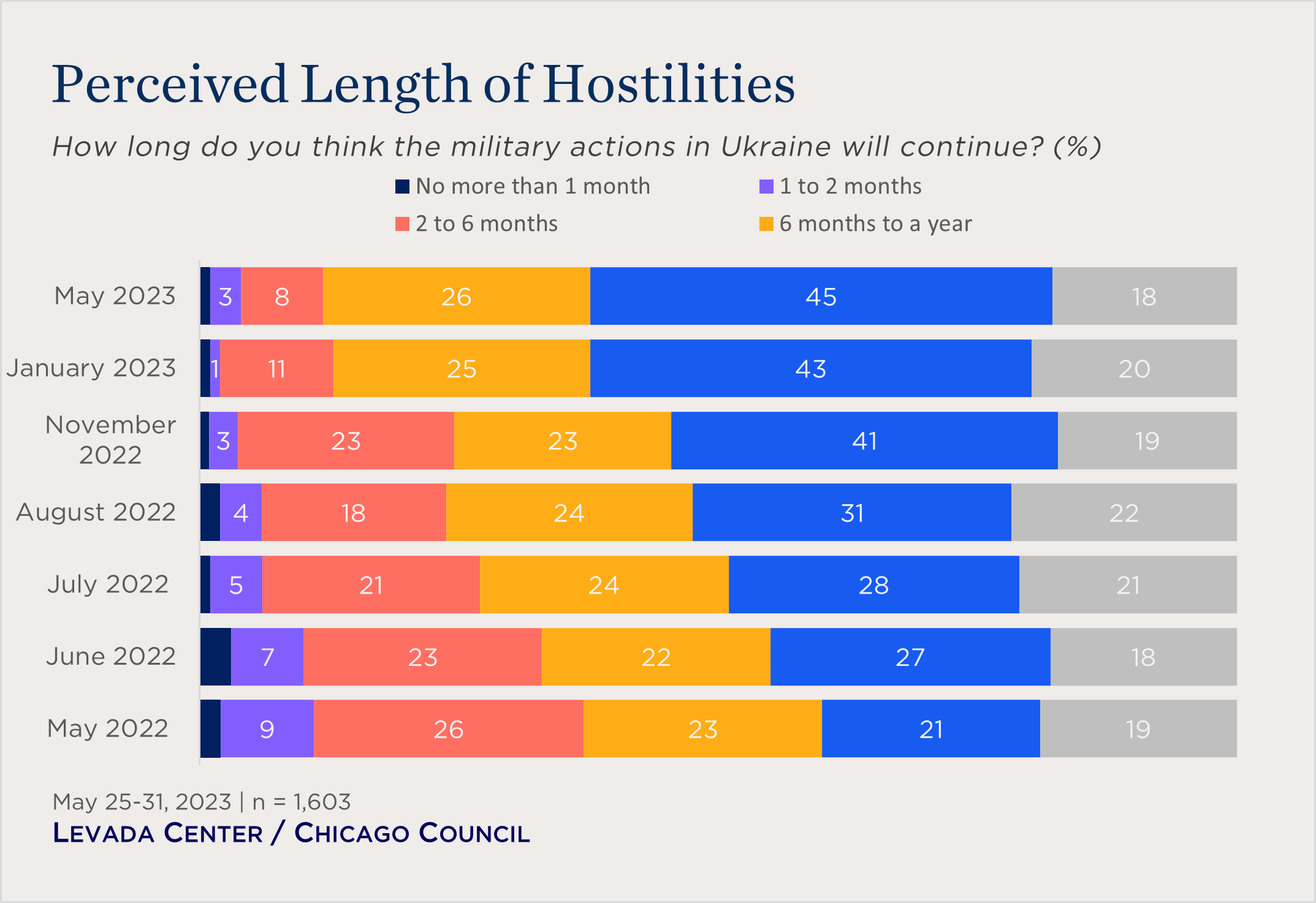
Parsing Support for the Military Operation
Many analysts and commentators who are closely following the situation in Ukraine have raised important questions about the high levels of Russian public support for the war, given the increasingly repressive atmosphere in the country. While response and refusal rates in Levada surveys have not shifted dramatically from previous surveys, data analysis reveals differences on questions that ask direct support for the military operation versus indirect support. As a rule of thumb, readers can assume that those who say they strongly (“definitely”) support the military action are akin to committed supporters, while those who somewhat (“rather”) support are more passive in their backing. As the table below shows, strong supporters are much more likely than passive supporters to:
- Definitely support a family member or close friend who voluntarily participated in the military operation in Ukraine (51% strongly support vs. 23% somewhat support)
- Sense more benefit than harm as a result of the conflict (56% vs. 35%)
- Prefer to continue the military action rather than move to negotiations (67% vs. 46%)
- Prefer to support rather than cancel the military operation if one could go back in time (68% vs. 47%)
- Condemn those who fled the country to avoid conscription (70% vs. 48%)
Support for 'Special Military Operation' across Russian Society on Several Dimensions
| % among those who support/oppose the actions of the Russian armed forces in Ukraine: | Definitely Support | Rather Support | Rather Oppose | Definitey Oppose |
|---|---|---|---|---|
| Definitely support voluntary participation of family/friend | 51 | 23 | 11 | 17 |
| SMO brought more benefits | 56 | 35 | 11 | 12 |
| SMO brought more damages | 23 | 44 | 78 | 83 |
| Continue SMO | 67 | 46 | 17 | 18 |
| Start peace negotiations | 39 | 48 | 80 | 73 |
| Negative view of those who fled conscription | 70 | 48 | 32 | 29 |
| Support the start of military operation if could go back in time | 68 | 47 | 14 | 11 |
| Cancel the start of military operation if could go back in time | 23 | 38 | 83 | 82 |
Conclusion
In sum, the Russian public as a whole feels more positive now than in previous surveys about the performance of their armed forces in Ukraine, but there are clear differences within Russian society on the effects of the conflict and whether it is time to negotiate or continue fighting. The results from this survey and other Russian polls show that widespread support for the military action is differentiated between true believers and some who are at least mildly skeptical. The survey and focus group results point to a need to study Russian public opinion holistically from many angles, and not hinge analysis on any single result.
- 1
Because of the Russian government restrictions on the use of certain terms to describe the Russian military action in Ukraine, the joint survey used either “military operation” or “military action” in most of these questions. To be true to the results, we use that language throughout the report.
- 2
According to Levada researchers, Muscovites have greater experience with people leaving and therefore might be more sympathetic than the average Russian.
This survey was part of Levada's monthly omnibus survey. Read the full methodology.
For this particular wave of the Levada Center's monthly omnibus survey, the interviews were conducted between May 25–31, 2023, among a representative sample of all Russian urban and rural residents. The sample comprised 1,603 people 18 or older in 138 municipalities of 56 regions of the Russian Federation (including Crimea). The survey was conducted as a personal interview in respondents’ homes. The answer distribution is presented as percentages of the total number of participants along with data from previous surveys.
The statistical error of these studies for a sample of 1,600 people (with a probability of 0.95) does not exceed:
- 3.4 percent for indicators around 50%
- 2.9 percent for indicators around 25%/75%
- 2.0 percent for indicators around 10%/90%
- 1.5 percent for indicators around 5%/95%
This work is made possible by the generous support of the Carnegie Corporation of New York.
The group discussions were conducted on April 20, 2023, at the Levada-Center’s Studio, among eight men and eight women aged 20 and older. Participants were selected by professional recruiters in Moscow using the “snowball” method through recruiters’ networks as well as those of previous participants of Levada-Center’s focus groups and were screened by age and gender. Any person who had participated in a focus group less than one year prior to this study and anyone who worked in the field of marketing or political and social sciences was excluded from the selection process. All 16 participants represented average Muscovites with some level of awareness about political news and with a variety of political attitudes.






Related Content
 Public Opinion
Public Opinion
A slim majority think Moscow should open up negotiations, but it is unclear what they might be willing to concede.
 Public Opinion
Public Opinion
But those feeling an economic pinch are more likely to say that Moscow should enter peace negotiations.
 Public Opinion
Public Opinion
A solid majority (69%) say that it would never be justified for Moscow to use a tactical nuclear weapon in its current military operation against Kyiv.
 Public Opinion
Public Opinion
Nearly half of Americans (47%) now say Washington should urge Kyiv to settle for peace as soon as possible.
